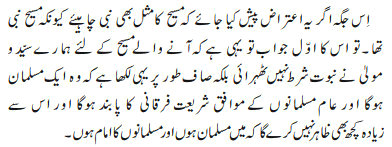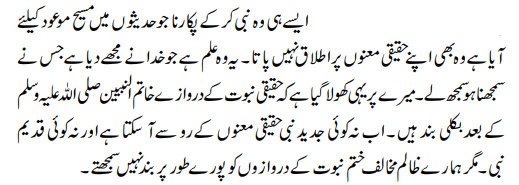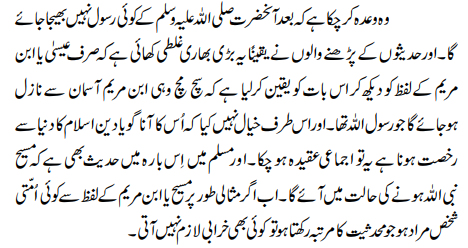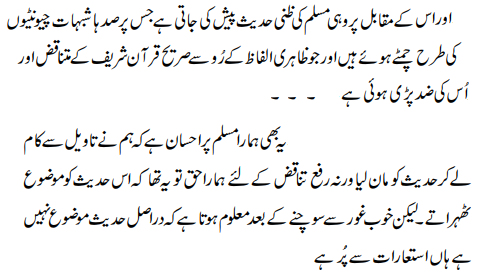Hadith in which the coming Jesus
is called ‘Prophet’
The Qadiani group argues that the prophecies in Hadith
which refer to the coming Messiah describe him as “prophet of God” (nabi-ullah). Therefore, the Messiah-to-come was to be
a prophet and as Hazrat Mirza Ghulam Ahmad claimed to be the Promised
Messiah this means that he is a prophet.
During Hazrat Mirza Ghulam Ahmad’s lifetime his opponent Muslim
religious leaders used to raise against him exactly this objection:
that as the coming Messiah is called nabi in Hadith, therefore
the true Messiah should be a prophet, and this can only mean the coming
of the prophet Jesus himself in person.
Hazrat Mirza responded to this objection by saying:
- The word nabi about the coming Messiah in Hadith does not mean a prophet, but is used metaphorically as meaning a wali or muhaddas (a muhaddas is one who is not a prophet, but
receives revelation from Allah of the kind which auliya or
saints receive.)
- The Hadith report which refers to the coming Messiah as nabi is doubtful, inauthentic and cannot be accepted as it stands.
(Note: The English section below is followed by the original
Urdu texts of all the quoted statements. After each English translation,
the reference to the book name is a link leading to the point where the original Urdu text is given.
Similarly, before each Urdu text the reference to the book
name is a link back to its translation .)
A. Coming Messiah in Hadith would not be a prophet
As to the first point, Hazrat Mirza Ghulam Ahmad wrote:
1. “If the objection be raised here that, as the
Messiah (Jesus) was a prophet, his like should also be a prophet, the
first answer to this is that our leader and master (the Holy Prophet
Muhammad) has not made prophethood a necessary condition for the Messiah
to come. On the other hand, it is clearly written that he shall be a
Muslim, and shall be subject to the Shariah of the Quran like ordinary
Muslims, and he shall not go further than (saying) this that he is a Muslim and
the imam of Muslims.”
— Tauzih Maram, pp. 17–18. Ruhani Khaza’in, vol. 3, p. 59–60.
2. “The name ‘prophet of God’ for the Promised
Messiah, which is to be found in Sahih Muslim etc. from the blessed
tongue of the Holy Prophet, is meant in the same metaphorical sense
as that in which it occurs in Sufi literature as an accepted and common
term for the recipient of Divine communication. Otherwise, how can there
be a prophet after the Khatam al-anbiya?”
— Anjam Atham, footnote, p. 28. Ruhani Khaza’in, vol. 11, p. 28.
Let Qadianis ponder over the last sentence:
“How can there be a prophet after the Khatam
al-anbiya?”
This shows plainly that Hazrat Mirza took this term to mean the Last of
the Prophets.
3. “…similarly the Promised Messiah being called nabi in Hadith is not meant in a real sense. This is the knowledge
which God has given me. Let him understand, who will. This very
thing has been disclosed to me that the doors of real prophethood
are fully closed after the Khatam an-nabiyyin, the Holy
Prophet Muhammad. According to the real meaning, no new prophet
nor an ancient prophet can now come. However, our unjust opponents do not consider the doors of the finality of prophethood to be completely closed.”
— Siraj Munir, p. 3. Ruhani Khaza’in, vol. 12, p.
5.
4. “And it should also be remembered that in Sahih
Muslim the word nabi has occurred with reference to the Promised
Messiah, that is to say, by way of metaphor.”
— Ayyam as-Sulh, p. 75. Ruhani Khaza’in, vol. 14, p.
309.
5. “These words (rasul, nabi) are used by way of metaphor,
just as in Hadith also the word nabi has been used for
the Promised Messiah.
… And
he who discloses news of the unseen, having received it from God,
is known as nabi in Arabic. The meanings in Islamic terminology
are different. Here only the linguistic meaning is intended.”
— Arba‘in no. 2, p. 18, footnote. Ruhani Khaza’in, vol. 17, p. 366.
6. “God has promised that no rasul shall be sent after
the Holy Prophet Muhammad, and the students of Hadith have surely
made an extremely grave error in believing, by just seeing the word
‘Jesus’ or ‘son of Mary’, that the very same son of Mary, who was
a rasul of God, shall descend from heaven. It did not occur to
them that his coming is tantamount to the departure of the religion
of Islam from this world. In Sahih Muslim there is a hadith about
this, namely, that the Messiah shall come as a nabi of God. Now
if, in a symbolic sense, by ‘Messiah’ or ‘son of Mary’ is meant
a member of the Muslim community who holds the rank of muhaddas, then no difficulty arises.”
— Izala Auham, p. 586. Ruhani Khaza’in, vol. 3, p. 416.
7. “The Holy Quran clearly states that the Holy
Prophet Muhammad is the Khatam al-anbiya. But our opponents make
Jesus the Khatam al-anbiya, and they say that the mention of
the Messiah as prophet of God in Sahih Muslim and elsewhere refers
to real prophethood.”
— Kitab al-Bariyya, p. 191, footnote. Ruhani Khaza’in, vol. 13, p. 224.
According to this last extract, it was the “opponents” of Hazrat Mirza Ghulam
Ahmad who believed that the word nabi about the coming Messiah in Hadith
means real prophethood. And the Qadianis today hold the same
belief which the opponents of Hazrat Mirza Ghulam Ahmad held and
which he refuted!
This extract also shows that Hazrat Mirza considered the term Khatam al-anbiya to mean the last of the Prophets, because he
says that if Jesus came after the Holy Prophet Muhammad then it is Jesus
who would become the Khatam al-anbiya.
If Khatam al-anbiya meant the “best” of the Prophets but
not the last (as Qadianis today tell us), then Jesus could still come
after the Holy Prophet and yet the Holy Prophet would remain Khatam
al-anbiya.
But Hazrat Mirza Ghulam Ahmad says, here and elsewhere, that if Jesus came
after the Holy Prophet Muhammad then the Holy Prophet would not remain
the Khatam al-anbiya, and Jesus would become Khatam al-anbiya.
This shows clearly that he took the term Khatam al-anbiya to
mean the Last of the Prophets.
B. Hadith report describing Messiah as nabi is doubtful
Now we turn to the second point, i.e. Hazrat Mirza's comments
on the hadith report in Sahih Muslim reported by Nawas ibn Saman (in
which the coming Messiah is called nabi-ullah). Hazrat Mirza
Ghulam Ahmad wrote:
1. “This is the hadith which the Imam Muslim has
recorded in Sahih Muslim, which has been omitted by Bukhari, the chief
of the collectors of hadith, because he considered it to be weak.”
— Izala Auham, p. 220. Ruhani Khaza’in, vol. 3, p.209–210.
2. “The conclusion of this discussion is that the
hadith referring to Damascus put forward by Imam Muslim is shown to
be unreliable by another hadith contained in Muslim itself, and it is
clearly proved that the reporter Nawas has made a mistake in relating
this hadith.”
— Izala Auham, p. 237. Ruhani Khaza’in, vol. 3, p.220.
3. “As against this, that same doubtful hadith
of Muslim is presented which has hundreds of objections sticking to
it like ants, and which in its apparent words is utterly opposed to
the Holy Quran and contradictory to it. … It is a favour we have done
to the author of Muslim that we accepted this hadith by giving it a
different interpretation; otherwise it was our right to declare this
hadith as fabricated in order to remove the contradiction. But, after
thinking carefully, it is found that in fact this hadith is not fabricated
but is full of metaphors.”
— Tuhfa Golarwiya, pages 46–47. Ruhani Khaza’in, vol. 17, p.165–166.
Urdu texts of the above translations
Images of the original Urdu texts of the above references are shown
below.
A. Coming Messiah in Hadith would not be a prophet
1. Tauzih Maram, pp. 17–18. Ruhani Khaza’in, vol. 3, p. 59–60:

2. Anjam Atham, footnote, p. 28. Ruhani Khaza’in, vol. 11, p. 28:

3. Siraj Munir, p. 3. Ruhani Khaza’in, vol. 12, p.
5:

4. Ayyam as-Sulh, p. 75. Ruhani Khaza’in, vol. 14, p.
309:

5. Arba‘in no. 2, p. 18, footnote. Ruhani Khaza’in, vol. 17, p. 366:

6. Izala Auham, p. 586. Ruhani Khaza’in, vol. 3, p. 416:

7. Kitab al-Bariyya, p. 191, footnote. Ruhani Khaza’in, vol. 13, p. 224:

B. Hadith report describing Messiah as nabi is doubtful
1. Izala Auham, p. 220. Ruhani Khaza’in, vol. 3, p. 209–210:

2. Izala Auham, p. 237. Ruhani Khaza’in, vol. 3, p. 220:

3. Tuhfa Golarwiya, pages 46–47. Ruhani Khaza’in, vol. 17, p. 165–166:

|








